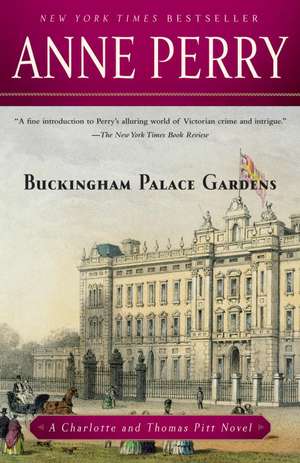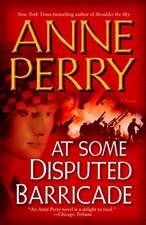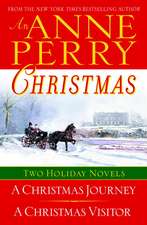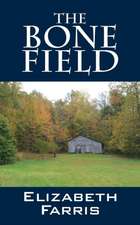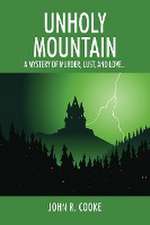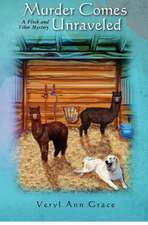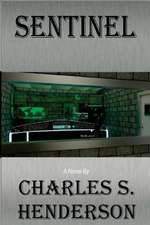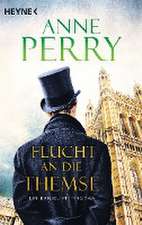Buckingham Palace Gardens: Charlotte & Thomas Pitt Novels (Paperback)
Autor Anne Perryen Limba Engleză Paperback – 30 sep 2011
Vezi toate premiile Carte premiată
Agatha Awards (2008)
Preț: 111.51 lei
Nou
Puncte Express: 167
Preț estimativ în valută:
21.34€ • 22.20$ • 17.62£
21.34€ • 22.20$ • 17.62£
Carte disponibilă
Livrare economică 25 martie-08 aprilie
Preluare comenzi: 021 569.72.76
Specificații
ISBN-13: 9780345523693
ISBN-10: 0345523695
Pagini: 312
Dimensiuni: 130 x 201 x 18 mm
Greutate: 0.23 kg
Editura: BALLANTINE BOOKS
Seria Charlotte & Thomas Pitt Novels (Paperback)
ISBN-10: 0345523695
Pagini: 312
Dimensiuni: 130 x 201 x 18 mm
Greutate: 0.23 kg
Editura: BALLANTINE BOOKS
Seria Charlotte & Thomas Pitt Novels (Paperback)
Notă biografică
Anne Perry is the bestselling author of two acclaimed series set in Victorian England: the William Monk novels, including Dark Assassin and The Shifting Tide, and the Charlotte and Thomas Pitt novels, including Buckingham Palace Gardens and Long Spoon Lane. She is also the author of the World War I novels No Graves As Yet, Shoulder the Sky, Angels in the Gloom, At Some Disputed Barricade, and We Shall Not Sleep, as well as six holiday novels, most recently A Christmas Grace. Anne Perry lives in Scotland.
From the Paperback edition.
From the Paperback edition.
Extras
Chapter One
She was apparently found in the linen cupboard, poor creature,” Narraway replied, his lean face dour, his eyes so dark they seemed black in the interior shadow of the hansom cab. Then, before Pitt could say anything further, he corrected himself. “One of the linen cupboards in Buckingham Palace. It was a particularly brutal murder.”
The vehicle jerked forward, throwing Pitt back in the seat. “A prostitute?” he said incredulously.
Narraway was silent for a moment. The horse’s hoofs clattered loudly, the carriage’s wheels rattling over the cobbles dangerously close to the pavement edge.
“Surely that’s a bad joke!” he said at last as they swung around the corner into The Mall and picked up speed again.
“Very bad,” Narraway agreed. “At least I hope so. But I fear it is perfectly serious. However, if Mr. Cahoon Dunkeld proves to be wasting our time exercising his sense of humor, I shall take great joy in personally putting him in jail—preferably one of our less pleasant ones.”
“It has to be a joke,” Pitt said, shivering at the thought. “There couldn’t be a murder at the Palace. How could a prostitute get in there, anyway?”
“Through the door, exactly as we shall, Pitt,” Narraway answered. “Don’t be naïve. And she was probably more welcome than we shall be.”
Pitt felt a little stung. “Who is Cahoon Dunkeld?” he asked, avoiding looking at Narraway. He had a reverence for Queen Victoria, especially now in her advanced age and widowhood, even though he was perfectly well aware of her reputed eccentricities and the fact that she had not always been so popular with her people. She had been in mourning too long, retreating not only from joy but also from duty. And he had gained some personal knowledge a couple of years ago of the extravagance and the self-indulgence of the Prince of Wales, and knew he kept several very expensive mistresses. Pitt had been superintendent of Bow Street then, and the conspiracy around the Prince had cost him his job and very nearly brought down the throne. That was why Pitt was now working for Victor Narraway in Special Branch, learning more about treason, anarchy, and other forms of violence against the State.
But the thought of a prostitute in the Queen’s home was different. It disgusted him, and he had difficulty concealing it, even though he knew Narraway found him plebeian amd faintly amusing for having such idealism.
“Who is Cahoon Dunkeld?” he repeated.
Narraway leaned forward a little. The dappled, early-morning sunlight of The Mall made bright patterns on the road. There was little traffic. It was not a residential area, and such horseback riders as were out would be cantering up and down Rotten Row on the edge of Hyde Park.
“An adventurer of considerable charm when he wishes, and undoubted ability, who is now seeking to become a gentleman in the more recognized social sense,” Narraway answered. “And apparently a friend of His Royal Highness.”
“What is he doing at the Palace at this hour of the morning?” Pitt said.
“That is what we are about to find out,” Narraway snapped as they came out of The Mall in front of the Palace. The magnificent wrought-iron railings were tipped with gold. Guards were on duty wearing bearskin helmets, their red tunics bright in the sun.
Pitt looked up at the sweeping façade itself and then at the roof. He saw with a flood of relief that there was no flag flying, indicating that Her Majesty was not in residence. At the same time he was inexplicably disappointed. He was quite aware that Narraway would find it gauche of him, but Pitt would like to have caught another glimpse of Her Majesty Queen Victoria. In spite of all common sense, there was a quickening of his heartbeat. Even inside the hansom cab he sat straighter, lifted his chin a little, and squared his shoulders.
If Narraway noticed, he did not allow himself even the slightest smile.
They swung round to the right, heading for the entrance where tradesmen and deliveries would go. They were stopped at the gate. Narraway gave his name, and immediately the guard stepped back and saluted. The cabdriver, startled into respect, urged his horse forward at a newly dignified pace.
Ten minutes later Pitt and Narraway were being conducted up the wide, elegant stairs by a manservant who had introduced himself as Tyndale. He was of slight build but he moved with suppleness, even some grace, although Pitt judged him to be well into his fifties. He was courteous enough, but quite obviously distressed beyond any ability to maintain his normal composure.
At any other time Pitt would have been fascinated to think that he was inside Buckingham Palace. Now all he could think of was the enormity of what lay ahead of them. The magnificence of history meant nothing.
Was this an idiotic practical joke? Tyndale’s pallid face and stiff shoulders said not, and for the first time since Narraway had made his extraordinary statement in the hansom, Pitt considered the possibility that it might be true.
They were at the top of the stairs. Tyndale walked across the landing and knocked on a door a little to the left. It was opened immediately by a man of much greater height than he, with broad shoulders and a dark face of remarkable dynamism. He was severely balding, but this in no way diminished his handsomeness. His gray hair must once have been black because his brows still were. His skin was burned by sun and wind to a deep bronze.
“Mr. Narraway has arrived, Mr. Dunkeld,” Tyndale said quietly.
“Good,” Dunkeld replied. “Now please leave us, and make sure that we are not interrupted. In fact, see that no staff come up onto this floor at all.” He turned to Narraway as if Tyndale was already gone. “Narraway?” he asked.
Narraway acknowledged it, and introduced Pitt.
“Cahoon Dunkeld.” The big man held out his hand and shook Narraway’s briefly. He ignored Pitt except for a nod of his head. “Come in, close the door.”
He turned and led the way into the charming, highly overfurnished room. Its wide, tall windows overlooked a garden, and beyond them the trees were motionless billows of green in the morning sun.
Dunkeld remained standing in the middle of the floor. He spoke solely to Narraway. “There has been a shocking event. I have never seen anything quite so . . . bestial. How it should happen here, of all places, is beyond my comprehension.”
“Tell me exactly what has happened, Mr. Dunkeld,” Narraway responded. “From the beginning.”
Dunkeld winced, as if the memory were painful. “From the beginning? I woke early. I . . .”
Deliberately Narraway sat down in one of the large overstuffed chairs covered in wine-colored brocade. He crossed his legs elegantly, if a little rigidly, at the knees. “The beginning, Mr. Dunkeld. Who are you, and why are you here at this hour of the morning?”
“For God’s sake . . . !” Dunkeld burst out. Then controlling himself with obvious difficulty, body stiff, he sat down also and began to explain. He had the air not of having grasped Narraway’s reasoning so much as being given no choice but to humor a lesser intelligence. His fingers drummed on the arm of his chair.
“His Royal Highness, the Prince of Wales, is deeply interested in an engineering project that may be undertaken by my company, and certain of my colleagues,” he began again. “Four of us are here at his invitation in order to discuss the possibilities—the details, if you like. Our wives have accompanied us to give it the appearance of a social occasion. The other three are Julius Sorokine, Simnel Marquand, and Hamilton Quase. We have been here two days already, and the discussions have been excellent.”
Pitt remained on his feet, listening and watching Dunkeld’s face. His expression was intense, his eyes burning with enthusiasm. His left hand, gripping the chair arm, was white at the knuckles.
“Yesterday evening we celebrated our progress so far,” Dunkeld continued. “I assume you are a man of the world, and do not need to have every detail drawn for you? The ladies retired early. We sat up considerably longer, and a certain amount of entertainment was provided. The brandy was excellent, the company both relaxing and amusing. We were all in high spirits.” Not once did he glance at Pitt as he spoke. He might have been as invisible as a servant.
“I see,” Narraway answered expressionlessly.
“We retired between one and two in the morning,” Dunkeld went on. “I awoke early—about six, I imagine. I was in my robe, not yet dressed, when my valet came with a message that he had received over the telephone. It was a matter His Royal Highness had asked to be informed of immediately, so, in spite of the hour, I took it to him. I returned to my room, shaved and dressed, had a cup of tea, and was on my way back to see His Royal Highness further about the matter, but passing the linen cupboard in the passage I saw the door slightly open.” His voice was harsh with tension. “That in itself, of course, is of no interest, but I became aware of a curious odor, and when I pulled it wider . . . I saw . . . probably the most dreadful thing I have ever seen.” He blinked and seemed to need a moment to compose himself again.
Narraway did not interrupt him, nor move his gaze from Dunkeld’s face.
“The naked body of a woman, covered in blood,” Dunkeld said hoarsely. “There was blood all over the rest of the linen.” He gulped air. “For a moment, I could not believe it. I thought I must have taken more brandy than I had imagined and become delirious. I don’t know how long I stood there, leaning against the door frame. Then I backed into the corridor. There was no one else in sight.”
Narraway nodded.
“I closed the door.” Dunkeld seemed to find some comfort in remembering the act, as if he could at the same time close the horror from his inner vision. “I called Tyndale, the man who called you. He is the principal manservant in this guest wing. I told him that one of the women from the previous evening had been found dead, that he must keep all servants from that corridor; serve breakfast to the other guests in their rooms. Then I asked for the telephone and called you.”
“Is His Royal Highness aware of this event?” Narraway asked.
Dunkeld blinked. “Naturally I had to inform him. He has given me full authority to act in his name and get this ghastly tragedy cleared up with the utmost haste, and absolute discretion. You cannot fail to be aware of the scandal it would cause if it became public.” His eyes were hard, demanding, and the very slight lift in his voice suggested he needed reassurance of both Narraway’s intelligence and his tact. “Her Majesty will be returning next week, on her way from Osborne to travel north to Balmoral. It is imperative that your investigation is entirely accomplished before that time. Do you understand me?”
Pitt felt his stomach knot, and suddenly there was barely enough air in the room for him to breathe. He had been here minutes, and yet he felt imprisoned.
He must have made a slight sound, because Dunkeld looked at him, then back at Narraway. “What about your man here?” he asked abruptly. “How far can you trust his discretion? And his ability to handle such a vital matter? And it is vital. If it became public, it would be ruinous, even affect the safety of the realm. Our business here concerns a profoundly important part of the Empire. Not only fortunes but nations could be changed by what we do.” He was staring at Narraway as if by sheer will he could force some understanding into him, even a fear of failure.
Narraway gave a very slight shrug. It was a minimal, elegant gesture of his shoulders. He was far leaner than Dunkeld, and more at ease in his beautifully tailored jacket. “He is my best,” he answered.
Dunkeld looked unimpressed. “And discreet?” he persisted.
“Special Branch deals with secrets,” Narraway told him.
Dunkeld’s eyes turned to Pitt and surveyed him coolly.
Narraway rose to his feet. “I would like to see the body,” he announced.
Dunkeld took a deep breath and stood up also. He walked past Pitt and opened the door, leaving them to follow him. He led the way along the corridor with its ornately plastered and gilded ceiling, and up another broad flight of stairs. At the top he turned right past two doors to where a young footman stood at attention outside a third door.
From the Hardcover edition.
She was apparently found in the linen cupboard, poor creature,” Narraway replied, his lean face dour, his eyes so dark they seemed black in the interior shadow of the hansom cab. Then, before Pitt could say anything further, he corrected himself. “One of the linen cupboards in Buckingham Palace. It was a particularly brutal murder.”
The vehicle jerked forward, throwing Pitt back in the seat. “A prostitute?” he said incredulously.
Narraway was silent for a moment. The horse’s hoofs clattered loudly, the carriage’s wheels rattling over the cobbles dangerously close to the pavement edge.
“Surely that’s a bad joke!” he said at last as they swung around the corner into The Mall and picked up speed again.
“Very bad,” Narraway agreed. “At least I hope so. But I fear it is perfectly serious. However, if Mr. Cahoon Dunkeld proves to be wasting our time exercising his sense of humor, I shall take great joy in personally putting him in jail—preferably one of our less pleasant ones.”
“It has to be a joke,” Pitt said, shivering at the thought. “There couldn’t be a murder at the Palace. How could a prostitute get in there, anyway?”
“Through the door, exactly as we shall, Pitt,” Narraway answered. “Don’t be naïve. And she was probably more welcome than we shall be.”
Pitt felt a little stung. “Who is Cahoon Dunkeld?” he asked, avoiding looking at Narraway. He had a reverence for Queen Victoria, especially now in her advanced age and widowhood, even though he was perfectly well aware of her reputed eccentricities and the fact that she had not always been so popular with her people. She had been in mourning too long, retreating not only from joy but also from duty. And he had gained some personal knowledge a couple of years ago of the extravagance and the self-indulgence of the Prince of Wales, and knew he kept several very expensive mistresses. Pitt had been superintendent of Bow Street then, and the conspiracy around the Prince had cost him his job and very nearly brought down the throne. That was why Pitt was now working for Victor Narraway in Special Branch, learning more about treason, anarchy, and other forms of violence against the State.
But the thought of a prostitute in the Queen’s home was different. It disgusted him, and he had difficulty concealing it, even though he knew Narraway found him plebeian amd faintly amusing for having such idealism.
“Who is Cahoon Dunkeld?” he repeated.
Narraway leaned forward a little. The dappled, early-morning sunlight of The Mall made bright patterns on the road. There was little traffic. It was not a residential area, and such horseback riders as were out would be cantering up and down Rotten Row on the edge of Hyde Park.
“An adventurer of considerable charm when he wishes, and undoubted ability, who is now seeking to become a gentleman in the more recognized social sense,” Narraway answered. “And apparently a friend of His Royal Highness.”
“What is he doing at the Palace at this hour of the morning?” Pitt said.
“That is what we are about to find out,” Narraway snapped as they came out of The Mall in front of the Palace. The magnificent wrought-iron railings were tipped with gold. Guards were on duty wearing bearskin helmets, their red tunics bright in the sun.
Pitt looked up at the sweeping façade itself and then at the roof. He saw with a flood of relief that there was no flag flying, indicating that Her Majesty was not in residence. At the same time he was inexplicably disappointed. He was quite aware that Narraway would find it gauche of him, but Pitt would like to have caught another glimpse of Her Majesty Queen Victoria. In spite of all common sense, there was a quickening of his heartbeat. Even inside the hansom cab he sat straighter, lifted his chin a little, and squared his shoulders.
If Narraway noticed, he did not allow himself even the slightest smile.
They swung round to the right, heading for the entrance where tradesmen and deliveries would go. They were stopped at the gate. Narraway gave his name, and immediately the guard stepped back and saluted. The cabdriver, startled into respect, urged his horse forward at a newly dignified pace.
Ten minutes later Pitt and Narraway were being conducted up the wide, elegant stairs by a manservant who had introduced himself as Tyndale. He was of slight build but he moved with suppleness, even some grace, although Pitt judged him to be well into his fifties. He was courteous enough, but quite obviously distressed beyond any ability to maintain his normal composure.
At any other time Pitt would have been fascinated to think that he was inside Buckingham Palace. Now all he could think of was the enormity of what lay ahead of them. The magnificence of history meant nothing.
Was this an idiotic practical joke? Tyndale’s pallid face and stiff shoulders said not, and for the first time since Narraway had made his extraordinary statement in the hansom, Pitt considered the possibility that it might be true.
They were at the top of the stairs. Tyndale walked across the landing and knocked on a door a little to the left. It was opened immediately by a man of much greater height than he, with broad shoulders and a dark face of remarkable dynamism. He was severely balding, but this in no way diminished his handsomeness. His gray hair must once have been black because his brows still were. His skin was burned by sun and wind to a deep bronze.
“Mr. Narraway has arrived, Mr. Dunkeld,” Tyndale said quietly.
“Good,” Dunkeld replied. “Now please leave us, and make sure that we are not interrupted. In fact, see that no staff come up onto this floor at all.” He turned to Narraway as if Tyndale was already gone. “Narraway?” he asked.
Narraway acknowledged it, and introduced Pitt.
“Cahoon Dunkeld.” The big man held out his hand and shook Narraway’s briefly. He ignored Pitt except for a nod of his head. “Come in, close the door.”
He turned and led the way into the charming, highly overfurnished room. Its wide, tall windows overlooked a garden, and beyond them the trees were motionless billows of green in the morning sun.
Dunkeld remained standing in the middle of the floor. He spoke solely to Narraway. “There has been a shocking event. I have never seen anything quite so . . . bestial. How it should happen here, of all places, is beyond my comprehension.”
“Tell me exactly what has happened, Mr. Dunkeld,” Narraway responded. “From the beginning.”
Dunkeld winced, as if the memory were painful. “From the beginning? I woke early. I . . .”
Deliberately Narraway sat down in one of the large overstuffed chairs covered in wine-colored brocade. He crossed his legs elegantly, if a little rigidly, at the knees. “The beginning, Mr. Dunkeld. Who are you, and why are you here at this hour of the morning?”
“For God’s sake . . . !” Dunkeld burst out. Then controlling himself with obvious difficulty, body stiff, he sat down also and began to explain. He had the air not of having grasped Narraway’s reasoning so much as being given no choice but to humor a lesser intelligence. His fingers drummed on the arm of his chair.
“His Royal Highness, the Prince of Wales, is deeply interested in an engineering project that may be undertaken by my company, and certain of my colleagues,” he began again. “Four of us are here at his invitation in order to discuss the possibilities—the details, if you like. Our wives have accompanied us to give it the appearance of a social occasion. The other three are Julius Sorokine, Simnel Marquand, and Hamilton Quase. We have been here two days already, and the discussions have been excellent.”
Pitt remained on his feet, listening and watching Dunkeld’s face. His expression was intense, his eyes burning with enthusiasm. His left hand, gripping the chair arm, was white at the knuckles.
“Yesterday evening we celebrated our progress so far,” Dunkeld continued. “I assume you are a man of the world, and do not need to have every detail drawn for you? The ladies retired early. We sat up considerably longer, and a certain amount of entertainment was provided. The brandy was excellent, the company both relaxing and amusing. We were all in high spirits.” Not once did he glance at Pitt as he spoke. He might have been as invisible as a servant.
“I see,” Narraway answered expressionlessly.
“We retired between one and two in the morning,” Dunkeld went on. “I awoke early—about six, I imagine. I was in my robe, not yet dressed, when my valet came with a message that he had received over the telephone. It was a matter His Royal Highness had asked to be informed of immediately, so, in spite of the hour, I took it to him. I returned to my room, shaved and dressed, had a cup of tea, and was on my way back to see His Royal Highness further about the matter, but passing the linen cupboard in the passage I saw the door slightly open.” His voice was harsh with tension. “That in itself, of course, is of no interest, but I became aware of a curious odor, and when I pulled it wider . . . I saw . . . probably the most dreadful thing I have ever seen.” He blinked and seemed to need a moment to compose himself again.
Narraway did not interrupt him, nor move his gaze from Dunkeld’s face.
“The naked body of a woman, covered in blood,” Dunkeld said hoarsely. “There was blood all over the rest of the linen.” He gulped air. “For a moment, I could not believe it. I thought I must have taken more brandy than I had imagined and become delirious. I don’t know how long I stood there, leaning against the door frame. Then I backed into the corridor. There was no one else in sight.”
Narraway nodded.
“I closed the door.” Dunkeld seemed to find some comfort in remembering the act, as if he could at the same time close the horror from his inner vision. “I called Tyndale, the man who called you. He is the principal manservant in this guest wing. I told him that one of the women from the previous evening had been found dead, that he must keep all servants from that corridor; serve breakfast to the other guests in their rooms. Then I asked for the telephone and called you.”
“Is His Royal Highness aware of this event?” Narraway asked.
Dunkeld blinked. “Naturally I had to inform him. He has given me full authority to act in his name and get this ghastly tragedy cleared up with the utmost haste, and absolute discretion. You cannot fail to be aware of the scandal it would cause if it became public.” His eyes were hard, demanding, and the very slight lift in his voice suggested he needed reassurance of both Narraway’s intelligence and his tact. “Her Majesty will be returning next week, on her way from Osborne to travel north to Balmoral. It is imperative that your investigation is entirely accomplished before that time. Do you understand me?”
Pitt felt his stomach knot, and suddenly there was barely enough air in the room for him to breathe. He had been here minutes, and yet he felt imprisoned.
He must have made a slight sound, because Dunkeld looked at him, then back at Narraway. “What about your man here?” he asked abruptly. “How far can you trust his discretion? And his ability to handle such a vital matter? And it is vital. If it became public, it would be ruinous, even affect the safety of the realm. Our business here concerns a profoundly important part of the Empire. Not only fortunes but nations could be changed by what we do.” He was staring at Narraway as if by sheer will he could force some understanding into him, even a fear of failure.
Narraway gave a very slight shrug. It was a minimal, elegant gesture of his shoulders. He was far leaner than Dunkeld, and more at ease in his beautifully tailored jacket. “He is my best,” he answered.
Dunkeld looked unimpressed. “And discreet?” he persisted.
“Special Branch deals with secrets,” Narraway told him.
Dunkeld’s eyes turned to Pitt and surveyed him coolly.
Narraway rose to his feet. “I would like to see the body,” he announced.
Dunkeld took a deep breath and stood up also. He walked past Pitt and opened the door, leaving them to follow him. He led the way along the corridor with its ornately plastered and gilded ceiling, and up another broad flight of stairs. At the top he turned right past two doors to where a young footman stood at attention outside a third door.
From the Hardcover edition.
Recenzii
“A fine introduction to Perry’s alluring world of Victorian crime and intrigue.”—The New York Times Book Review
“Another winner . . . a wonderful cast of characters with many twisting plots.”—Vero Beach Press Journal
“Perry writes with an intelligence that’s both refreshing and entertaining.”—The Arizona Republic
“Perry is my choice for today’s best mystery writer of Victoriana.”—St. Louis Post-Dispatch
“[Perry’s] grasp of Victorian character and conscience astonishes.”—The Plain Dealer
“Another winner . . . a wonderful cast of characters with many twisting plots.”—Vero Beach Press Journal
“Perry writes with an intelligence that’s both refreshing and entertaining.”—The Arizona Republic
“Perry is my choice for today’s best mystery writer of Victoriana.”—St. Louis Post-Dispatch
“[Perry’s] grasp of Victorian character and conscience astonishes.”—The Plain Dealer
Premii
- Agatha Awards Nominee, 2008
